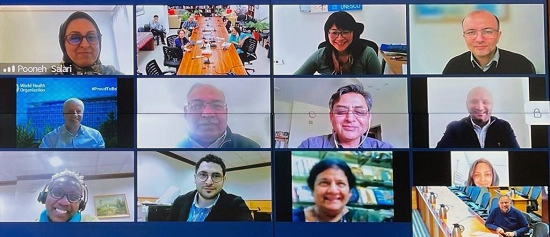
14 April 2022 | Cairo - In collaboration with UNESCO/Arab States and WHO collaborating centres on bioethics, the Department of Science Information and Dissemination's research promotion and development programme organized a webinar on 14 March to discuss challenges facing bioethics education during the COVID-19 pandemic. The webinar was inaugurated by Director Dr Arash Rashidian and co-led by Dr Andreas Reis of Global Health Ethics at WHO headquarters.
Presentations from UNESCO (Dr Seiko Sugita) and WHO collaborating centres hosted by regional institutions in the Islamic Republic of Iran (Dr Pooneh Salari); Lebanon (Dr Thalia Arawi), and Pakistan (Dr Bushra Shirazi) shed the light on scope, measures, target groups, cultural context and challenges of bioethics education, including research ethics, during the COVID-19 pandemic. Dr Sugita said that UNESCO collaborates closely with national bioethics committees to create awareness and influence policies using normative instruments e.g., Declaration on Ethical Principles in Relation to Climate Change (2017); Regional Charter on Ethics of Scientific Research (2019); and recommendations on ethics for artificial intelligence.
Dr Salari shared the experiences, advantages and disadvantages of virtual bioethics education for undergraduate and post graduate programmes on COVID-19 by Tehran University of Medical Sciences, and recommended that there should be one face-to-face meeting at the beginning of each semester and recording of all virtual classes.
Dr Arawi stated that necro-education was about the emerging nature of education, access to education, inadequate infrastructure, lack of basic resources in the teaching-learning process, injustices and diversities in all instances.
Dr Shirazi pointed out that physical, on-campus teaching allowed close interactions between teachers. However, faculty also learnt new techniques while switching to virtual mode that could be incorporated into physical modules. Professor Farhat Moazzam commented that, “when one teaches bioethics, it is a dialogue and during a dialogue the online way of teaching is always a challenge”.
This was followed by a question and answer session, during which further comparative analysis was elaborated upon, with prospects of further coordination between WHO collaborating centres in the Region.
The webinar concluded on the note that more research was needed to understand the level of research in bioethics that had been carried out since the start of the pandemic.


